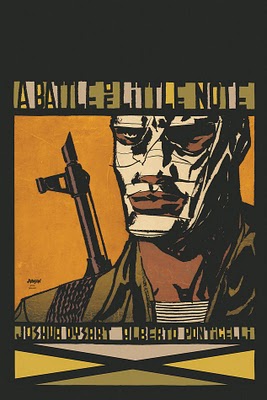Unknown Soldier: The Dysart Interview Pt. 6
By Beth Davies-Stofka
March 8, 2011 - 10:40
 |
CBB: What do you think could be the highest or happiest outcome of Unknown Soldier?
JD: You know, it’s a period piece. The nature of the conflict we’re exploring has changed, even since I started writing the book. So I wanted the book to communicate the complexity and the beauty and the struggle that we see in the world in general. When we choose a tribe, and we become so regionally specific, like we have with the Acholi and with Acholiland Uganda, what we’re really doing is saying, “There’s a whole world out there. And this is one patch of ground. And you live in this relatively culturally isolated country, the United States of America, and hopefully this will turn you on to the notion that there are people living, and loving, and dying, and dreaming out there. And they do it in their own special way, and they do it in very culturally-specific ways, but they’re human beings.”
Ultimately, that’s what the book really wants to preach: universality. It wants to preach that there are more differences inside of ethnic groups than there are between ethnic groups. We are ultimately the same. If the book pulls that off, if it interests even one person in the outside world, and in social justice issues, and in thinking beyond their borders and their parameters, and beyond escapism, then we were a successful book as far as I’m concerned.
Tomorrow, I ask Dysart if there’s anything we can safely believe in. Be sure to tune in! The word “awesome” was invented for times like this.
Related Articles:
Unknown Soldier: The Dysart Interview Pt. 7
Unknown Soldier: The Dysart Interview Pt. 6
Unknown Soldier: The Dysart Interview Pt. 5
Unknown Soldier: The Dysart Interview Pt. 4
Unknown Soldier: The Dysart Interview Pt. 3
Unknown Soldier: The Dysart Interview Pt. 2
Unknown Soldier: The Dysart Interview Pt. 1
Unknown Soldier #25: Final Issue
Unknown Soldier #24
Unknown Soldier #21
